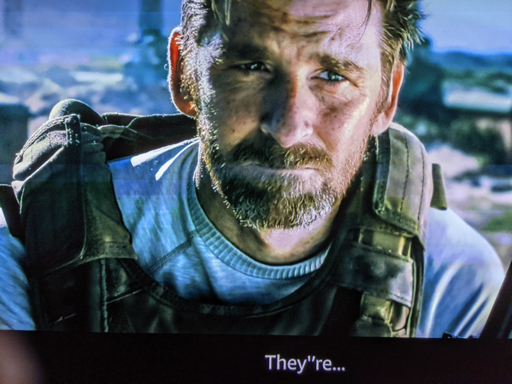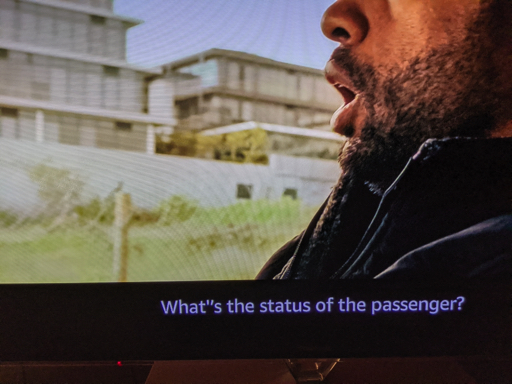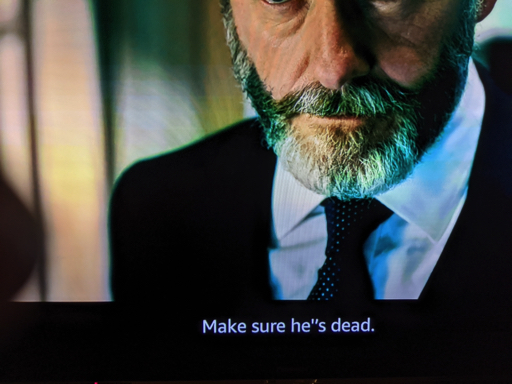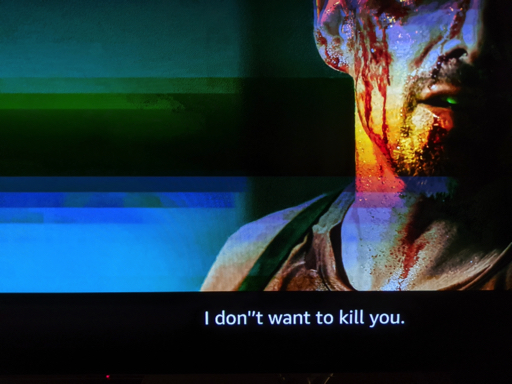August 6, 2024
Three introductions to Jacob Collier

Photo via Anton Diaz CC BY-NC-SA 2.0

August 6, 2024

Photo via Anton Diaz CC BY-NC-SA 2.0
May 1, 2021
As some of you know, I have been a tireless advocate for the Oxford Apostrophe that adds an extra apostrophe after the final apostrophed word in a series. Failing that, the OA calls for the totally needless insertion of apostrophes.
I know you mocked me for it; I could hear you all snickering during my every quiet moment. But once again I was merely ahead of my time:
Last night I watched a very bad John Wick wannabe movie, “24 Hours to Live“, mainly because it stars Ethan Hawke at his least poetic. Although the dialogue mainly consists of gunshots and last gasps, I had closed captioning on. Here are some screencaps:




I watched the entire thing again, and then sent it to Arizona for a recount, and this movie is 100% consistent in its embrace of the Oxford Apostrophe.
It’s happening, people. It’s happening.
January 14, 2021
There are no spoilers in what follows because I couldn’t spoil Tenet if I tried.
I am a huge fan of Christopher Nolan. Several of his movies rank among my favorites, including Memento, Inception, and Interstellar. But I like and admire all of his movies for their ideas, technical virtuosity, music, and sometimes unnecessary cleverness.
But I’ve just watched Tenet for the second time and it’s a bad movie. Oh, sure, it’s got some good points, but it doesn’t make sense to anyone except Nolan, and it is not fun to watch. It’s as if he decided to really outdo himself this time, so he goes over the top via a path that leads up his own ass.
Remember The Prestige? It’s structured like a magic trick (sorry, illusion) with the “prestige” — the big payoff — at the end. Tenet has a couple of moments at the end that made me say “Oh, cool!” to myself. But that was followed by a “Wait. What?” I don’t see how they make any stinking sense.
I am sure they do to Nolan. Buthis is a prestige that only works for the magician. Which means it’s not a good trick. (Sorry, illusion.) In fact, there’s exposition at the end to explain the movie’s prestige, which is like a magician saying , “So, here’s why you should have been amazed at what I just did. “
Despite the staggering amount of exposition in the movie — so very much exposition — the initial premise introduced after the opening set piece has consequences that I cannot make sense of. The movie seems at times to operate under arbitrary but convenient rules.
What’s worse, the movie fails — In my opinion, d’uh — as a movie. While John David Washington is good in the lead role, there really isn’t much at stake for him. I mean, the entire world is under threat, but we’re given little reason to care about him personally. The only person we actually care about is one of the very few women in the movie, a damsel in distress. (Really.) She’s paired with a Russian oligarch (really) that Kenneth Branagh struggles to give even one dimension; it could not be more cartoony. I did develop an affection for Robert Pattinson’s role, even though his character is also terribly underdeveloped; he’s there to get things done so the movie can move ahead even though they’d be impossible in real life. Because of my No Spoilers policy, here’s a made-up example: If Washington’s character — called only “The Protagonist” for reasons that make me think I’m missing the entire point — needed an armed tank to show up in Times Square, Pattinson would say “Want any decals on that?”
Nolan had a cool idea for a movie with a science fiction premise: “Suppose X”. X is promising. But then he had to make up a plot in which to deploy his idea. The plot is cliched and results in completely arbitrary set pieces that could have been replaced with an infinite number of set pieces from other movies without having any effect on anything else in the movie. The bad guy could be smuggling a McGuffin through Mardi Gras, a climbing expedition in the Alps, or a White House briefing. And that plot and those set pieces are the bulk of the movie.
There are scenes and moments to like about Tenet because it is, after all, a Christopher Nolan movie. But I am not tempted to see it a third time, and am a little pissed off that I thought a second watching would help.
May 2, 2020
SPOILER ALERT: I obviously don’t know how the season will end, but I am writing this knowing (or, more exactly, “knowing”) what happened in the first seven episodes. So there are spoilers below.
I have never ever even been close to predicting a season finale correctly. But does that stop me? Nah. Someday the script writers will learn to pay attention to how I say show will end the day before it ends and will use that to re-shoot the entire thing because they recognize the superiority of my sense of narrative, theme, and character. For example, did they listen to me when I said the only satisfying way to wrap up Leave it to Beaver would be for June to hire Eddie Haskel to take a hatchet to her husband Ward. Eddie was clearly a sociopath with father issues, and, come on, the family name was “Cleaver.” Talk about your heavy-handed foreshadowing! But would the writers listen? They never do.
Anyway, here’s definitely how Season 3 wraps up tomorrow night. I am certain that I’m getting this one right. 100%. Here goes:
We’ve been watching two simulations, one by Rehoboam the other by Solomon. Rehoboam’s is schizophrenic, because Serac is actually the crazy one, not his brother.
Rehoboam is based around the idea that with enough data, you can predict everything humans will do. Solomon was built on Serac’s brother’s belief that humans ultimately are more unpredictable than that. That’s why you need to gather as many of the “outliers” as you can and use them as a living AI farm. Each of the outliers entombed in the building with Solomon is processing a different world simulation, based not just on the data that Delos has provided from WestWorld but also on the outlier’s own character, personal experience, models, etc. Unless you do this, you end up with a simulation (Rehoboam’s) that is too regular and orderly.
Part of the Big Reveal: Caleb finds his own body in one of the pods in Solomon’s warehouse. His simulation (i.e., the simulation his body is having in conjunction with Solomon) is the most successful one.
Ok, that’s as far as I’ve gotten, except that I find myself hoping that Dolores wins, much as I love Thandie Newton. I’m not at all sure I’m supposed to be that sympathetic to Dolores given that she’s a manipulative, cold-blooded mass murderer. I may be influenced by how fantastically Rachel Evan Wood acts an amazingly complex and difficult role.
The one thing I’m certain of throughout all of this is, that Monday morning I’m going to be reading a bunch of recaps to find out what actually happened.
April 1, 2020
I spend a lot of time listening to podcasts – maybe a little less than back in Normal Times when I was commuting 1.5-2.0 hours a day, but if I’m putterin’, I’m pod-listenin’.
I find it wearying to envelope myself in coronavirus or political podcasts these days. I’m not sure why. Maybe you have some ideas. In any case, I’ve been turning to comedy more and more.
Here’s a list, in alphabetical order. I am not necessarily proud of any of these.
I also listen to many other podcasts that don’t talk about current events but are not comedic. Some are fantastic. But it’s comedy tonight!
What would you add to this list?
March 15, 2020
Someone on Twitter asked for movie titles with one letter removed that changes the movie altogether. Fun! And I’d link to the tweet but I’ve only been on Twitter since near its beginning so of course I don’t know how to go back from liked comments to the original. (If you know who came up with this movie challenge, please put in a comment to this post. Thanks.)
Anyway, here are mine:
May 19, 2019
SPOILER ALERT: I’m writing this hours before the final episode and will spoil prior episodes.
Based on the end of Episode 5 of Season 8 — the penultimate episode — it sure looks like Arya is on her way to kill Dany. But that’d be a cop out. I hope GoT goes all Red Weddingon us.
The GoT is a pacifist work intent on reminding us of the cost of war. War is unpredictable at both its micro level — even obvious heroes can be killed without warning — and macro level.
At the macro level, Dany certainly seems to have lost her claim to be a virtuous ruler. But so what? GoT should not end based on what will make its audience feel good.
Dany should become the ruler of Westeros. That will require killing Jon since he’s the legit heir to the throne. After that, the script writers will do the old Towering Infernothing of deciding who lives and who dies — for God’s sake, why did they have to kill Fred Astaire? — and who makes it. If I had to guess, I’d say Sansa dies, Tyrion survives in some humiliating role, and Arya lives on as an enemy. Because GoT should not fully resolve … which, given GRRM’s pace, it looks like it never will.
[Confidence level: 12%]

October 23, 2016
Here’s a spoiler based on nothing. Please note that I’m never right.
The Man in Black (Ed Harris) wil be revealed to be a robot. He was created by the the dead co-founder for some reason, like to be the chaos principle that will drive the genetic algorithms, or some other such sciencey sounding thing. (This would invert the Jurassic Park idea in the assumption that we can control nature is disproven. In WestWorld, according to my made-up spoiler, the park would have built in a principle of chaos.)
So, that’s settled.
October 3, 2016
I of course don’t know anything that you don’t about Game of Thrones. In fact, I know considerably less since I can’t keep any of the characters or backstory straight. Also, I have not read the books. And when there’s exposition explaining something like exactly why one of the guys with a scraggly beard is angry at the red-head who likes to take off her top, I check my email, see what’s up at DailyKos, and maybe get myself some Fritos.
Nevertheless, with all of the confidence of an ignorant man, I am quite certain of how it ends:
Blondie-with-Dragons mounts the Pointy Throne, frees the slaves and reforms Obamacare, and then dies, at which point the handsome dwarfy guy is given a boost and becomes the tiny perfect mayor of all of West Oreos.
Come back in a couple of years and be amaaaazed!
August 31, 2016
In 1974, the prestigious scholarly journal TV Guide published my original research that suggested that the inspector in Dostoyevsky’s Crime and Punishment was modeled on Socrates. I’m still pretty sure that’s right, and an actual scholarly article came out a few years later making the same case, by people who actually read Russian ‘n’ stuff.
Around the time that I came up with this hypothesis, the creators of the show Columbo had acknowledged that their main character was also modeled on Socrates. I put one and one together and …
Click on the image to go to a scan of that 1974 article.